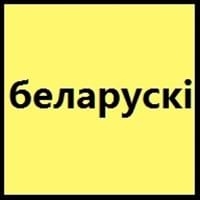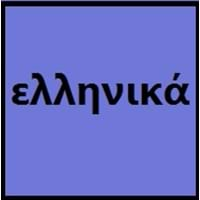Countries
Belarus, Poland
Cyprus, European Union, Greece
National Language
Belarus, Gambia
Albania, Cyprus, Egypt, France, Greece, Italy, Romania, Turkey, Ukraine
Second Language
Poland
Roman Empire
Speaking Continents
Asia
Asia, Europe
Minority Language
Czech Republic, Lithuania, Ukraine
Albania, Armenia, Australia, Hungary, Italy, Romania, Turkey, Ukraine
Regulated By
National Academy of Sciences of Belarus, National Languages Committee
Center for the Greek language (Κέντρον Ελληνικής Γλώσσας)
Interesting Facts
- Since 1918, Belarusian has been the official language of Belarus.
- Belarusian include many loanwords from Polish language.
- Greek is the longest documented language of all the Indo-European Langauges.
- The official language of education in the Roman Empire was Greek.
Similar To
Russian and Ukrainian
Armenian
Derived From
Not Available
Latin
Alphabets in
Belarusian-Alphabets.jpg#200
Greek-Alphabets.jpg#200
Scripts
Cyrillic
Arabic, Latin
Writing Direction
Not Available
Left-To-Right, Horizontal
Language Levels
Not Available
Time Taken to Learn
Not Available
Hello
dobry dzień
γεια σας (geia sas)
Thank You
Dziakuj
ευχαριστώ (ef̱charistó̱)
How Are You?
Jak vy ?
πώς είσαι (pó̱s eísai)
Good Night
Dabranač
Καληνυχτα (Kali̱nychta)
Good Evening
Dobry viečar
καλησπέρα (kali̱spéra)
Good Afternoon
dobry dzień
Καλὸ ἀπόγευμα (Kaló apóyevma)
Good Morning
Dobraj ranicy
καλημέρα (kali̱méra)
Please
Kali laska
παρακαλώ (parakaló̱)
Sorry
Vybačajcie
συγνώμη (sygnó̱mi̱)
Bye
da pabačennia
αντίο (antío)
I Love You
JA liubliu ciabie
Σε αγαπώ (Se agapó̱)
Excuse Me
Vybačajcie
Με συγχωρείτε! (Me synhoríte)
Dialect 1
North-Eastern Belarusian
Cappadocian Greek
Where They Speak
North-East Belarus
Greece
How Many People Speak
Not Available
Dialect 2
South-Western Belarusian
Griko
Where They Speak
South-West Belarus
Italy
How Many People Speak
Not Available
Dialect 3
Middle Belarusian
Mariupol
Where They Speak
Middle Belarus
Ukraine
Second Language Speakers
Not Available
Native Name
Беларуская мова (Bielaruskaja mova)
ελληνικά
Alternative Names
Belarusan, Belorussian, Bielorussian, Byelorussian, White Russian, White Ruthenian
Ellinika, Graecae, Grec, Greco, Neo-Hellenic, Romaic
French Name
biélorusse
grec moderne (après 1453)
German Name
Weißrussisch
Neugriechisch
Pronunciation
Not Available
[eliniˈka]
Ethnicity
Belarusians
Greeks or Hellenes
Origin
18th century
1500 BC
Language Family
Indo-European Family
Indo-European Family
Branch
Eastern
Not Available
Early Forms
Old East Slavic
Proto-Greek, Mycenaean Greek, Ancient Greek, Koine Greek and Medieval Greek
Standard Forms
Belarusian
Modern Greek
Signed Forms
Not Available
Greek Sign Language
Scope
Individual
Individual
ISO 639 6
Not Available
ells
Glottocode
bela1254
gree1276
Linguasphere
53-AAA-eb < 53-AAA-e (varieties: 53-AAA-eba to 53-AAA-ebg)
56-AAA-a
Language Type
Living
Living
Language Linguistic Typology
Not Available
Subject-Verb-Object
Language Morphological Typology
Not Available
Fusional, Synthetic
Belarusian and Greek Greetings
People around the world use different languages to interact with each other. Even if we cannot communicate fluently in any language, it will always be beneficial to know about some of the common greetings or phrases from that language. This is where Belarusian and Greek greetings helps you to understand basic phrases in Belarusian and Greek language. Belarusian word for "Hello" is dobry dzień or Greek word for "Thank You" is ευχαριστώ (ef̱charistó̱). Find more of such common Belarusian Greetings and Greek Greetings. These greetings will help you to be more confident when conversing with natives that speak these languages.
Belarusian vs Greek Difficulty
The Belarusian vs Greek difficulty level basically depends on the number of Belarusian Alphabets and Greek Alphabets. Also the number of vowels and consonants in the language plays an important role in deciding the difficulty level of that language. The important points to be considered when we compare Belarusian and Greek are the origin, speaking countries, language family, different greetings, speaking population of these languages. Want to know in Belarusian and Greek, which language is harder to learn? Time required to learn Belarusian is Not Available while to learn Greek time required is 44 weeks.





